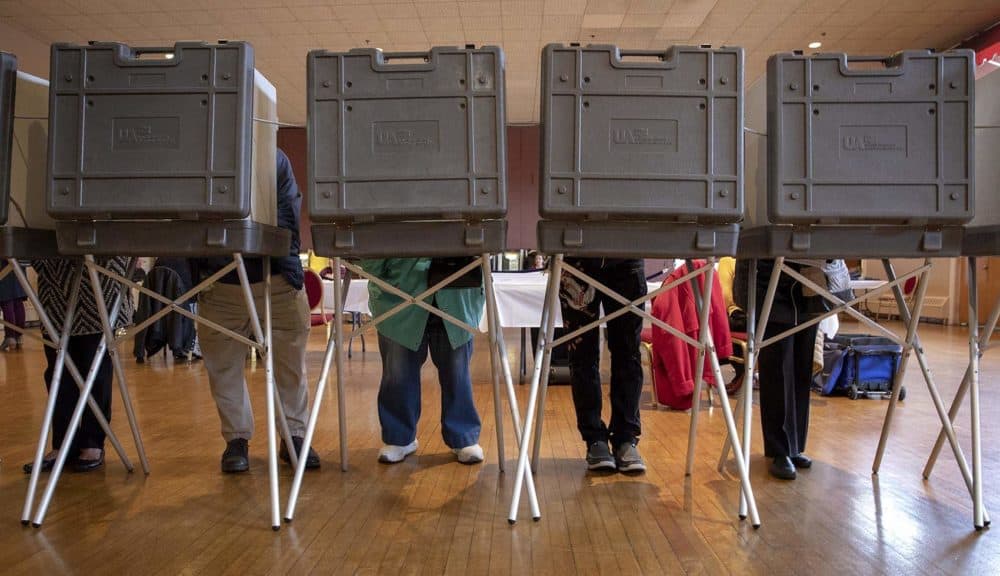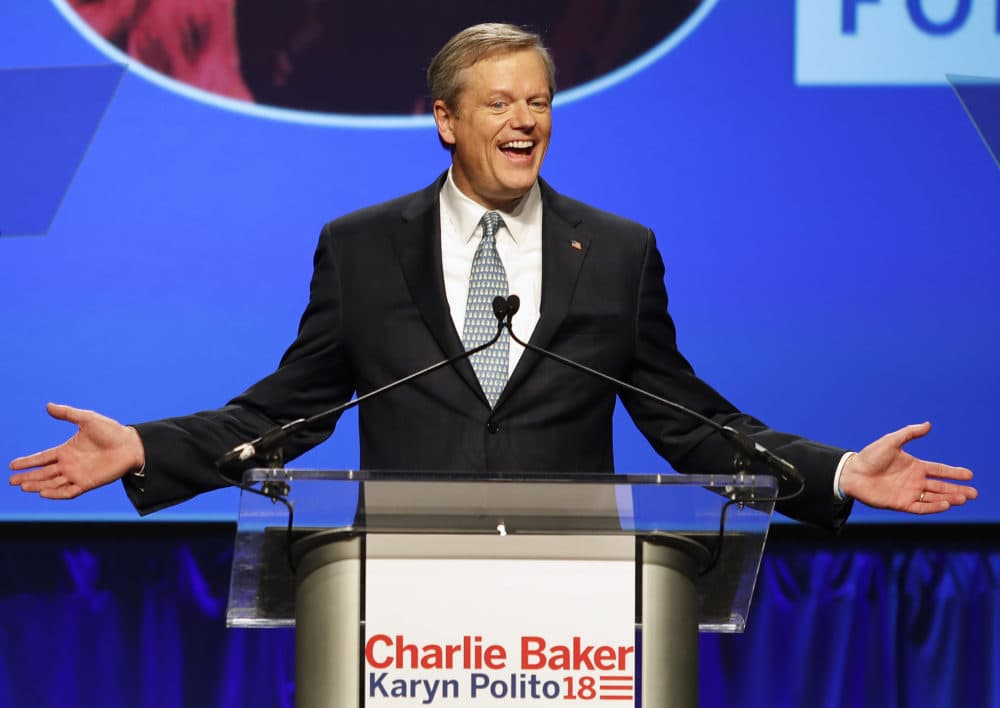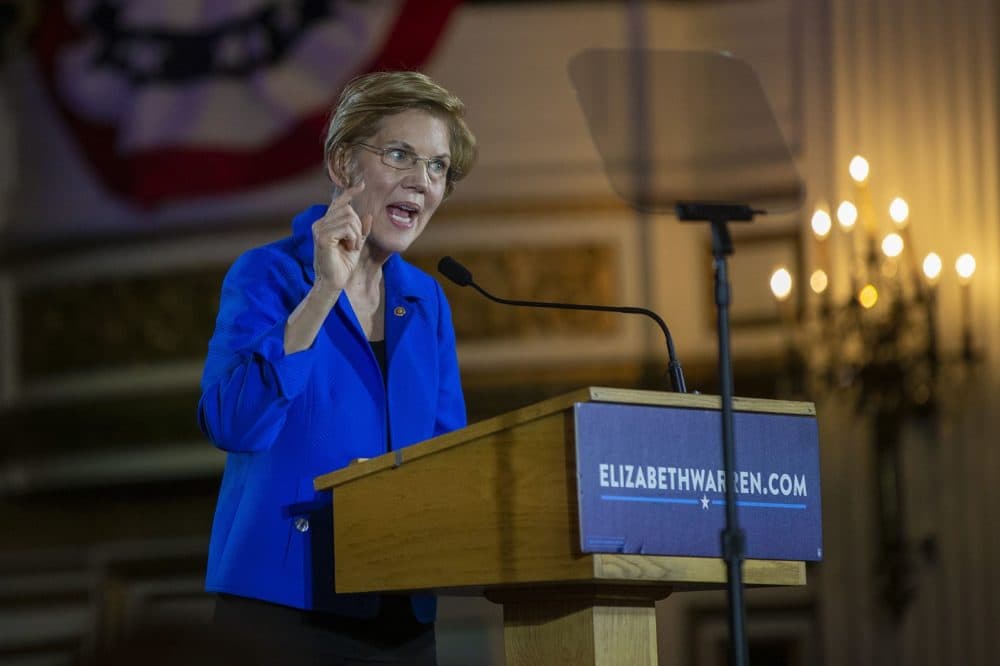Advertisement
Analysis
Political Changes Came Earlier In Mass. On Tuesday, Mostly Stability

In a tumultuous political year around America, change came early in Massachusetts, then gave way to a mostly quiet general election. A rollicking September primary saw a longtime congressman lose his seat, two reformers chosen for district attorney, and two high-ranking legislative leaders sent packing.
But on Tuesday, the general election came and went with few surprises and little change to the political structure in the state.
It wasn't always going to be this way. A year ago, we were facing the prospect of spirited contests with the de facto leaders of both parties running for Senate and governor. There were multiple billion-dollar ballot questions due to face voters, with the prospect of reshaping state finances for decades.
But somewhere along the way, Republican Gov. Charlie Baker and Democratic Sen. Elizabeth Warren set off down their separate paths to blowout victories, and the ballot question battles were fought on Beacon Hill rather than at the ballot box.

Governor: For Baker, the bipartisan coalition that has supported him throughout his first term showed up for his 34-point re-election blowout, based on unofficial AP vote counts. Even Boston was nearly tied. That’s Boston, where Republicans normally get trounced and where Baker lost by 36 points just four years ago.
Exit polls showed why: Democrat Jay Gonzalez managed only a 1- or 2-point margin among black and Latino voters statewide, and a 4-point win among self-identified Democrats.
Gonzalez himself ran a spirited campaign, but struggled to gain attention from voters, as did many challengers in statewide contests. Even in the final pre-election poll, 54 percent of voters had not formed either a positive or negative opinion of him. Even other Democratic leaders seemed largely content with a Republican governor and the party division that has been the norm in Massachusetts.
In the last 28 years — going on 32 by the end of Baker’s next term — we have had just one Democratic governor, even as Democrats have held massive majorities in both houses of the Legislature.

Senate: Warren’s 24-point margin was smaller than Baker’s, but impressive nonetheless for a figure who has been far more polarizing.
The AP exit polls show Warren pulled 93 percent of Democrats, and ran about even with Republican Geoff Diehl among unenrolled voters. That’s a recipe for a healthy win for a Massachusetts Democrat. Republicans need a strong margin among independents to make up for their built-in party deficit in the state.
Primary results made it automatically more difficult for Republicans to challenge Warren. Facing an already-difficult path to unseat Warren, Diehl’s primary win made unseating Warren a near impossibility. As a close ally of President Trump, Diehl was dragging the dead weight of Trump’s 32 percent approval rating from Pittsfield to Provincetown. Independent Shiva Ayyadurai, despite an elaborately constructed argument for why polls underestimated his support, drew 3 percent of the vote, less than any of the final polls showed for him.
Ballot Questions: The most consequential ballot questions never made it to the ballot at all. Legislative leaders worked behind closed doors to resolve questions covering a billion dollar sales tax cut, paid family leave and a minimum wage increase in a so-called "grand bargain." The Supreme Judicial Court struck down a ballot question which would have added a new surtax on incomes over $1 million.
That left just three questions facing voters statewide this year.
Question 1, which would have mandated certain nurse staffing ratios, went down to a lopsided 40-point margin, after tumbling in the polls through September and October. Even nurses, a key influencer in this ballot question, were divided on the measure by September, according to a WBUR poll.
Question 3, which was closely watched nationally, fared no better. The effort to repeal the transgender accommodations law earned the support of just 32 percent of voters. This was not a lock earlier in the campaign cycle. Polls earlier in 2018 showed a potentially narrow contest. But a solid and well-funded campaign pushed back on the proposed repeal. The issue was also widely discussed due to national news, with the Trump administration working to roll back transgender rights across the country. Voters overcame initial hesitation, and resoundingly endorsed the bill.
Congress: All nine Massachusetts seats in the U.S. House of Representatives will remain blue, as they have been since 1994 — a string of 110 consecutive Democratic wins. The delegation will have two new members, both women, pushing the number of women to three of nine, an all-time high. Ayanna Pressley defeated longtime Rep. Michael Capuano in the primary on her way to an uncontested general election. Lori Trahan emerged from a sprawling Democratic primary in the 3rd district, and delivered a solid thumping to Republican Rick Green.
Down The Ballot: All Democrats were re-elected to their statewide constitutional offices, including auditor, attorney general, secretary of state and treasurer. A few legislative seats changed hands, but Democrats will retain their massive super-majority in both houses, enabling them to pass whatever legislation they want and override vetoes.
Polling: The polls performed well in the state, calling the blowout races at the top of the ticket, and spotting the trend of cratering support for ballot Question 1.
Earlier this fall, much was made of the fact that a six-week-old poll we did for WBUR did not foresee Pressley’s coming victory in the Massachusetts 7th Congressional District primary. It was written up in national media, and folded in with an inaccurate unpublished internal poll in New York’s 14th Congressional District to create an unwarranted indictment of polling as a whole. Tuesday night confirms the polling here in Massachusetts remains reliable.
Across the country, voters once again upended the system, sweeping Democrats into office and sending many Republicans packing. But here in Massachusetts, the results show mostly stability.
